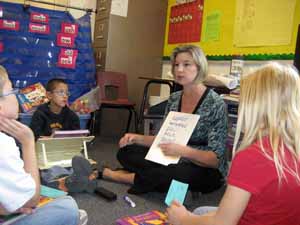Helping Students Who Are Blind or Low Vision Manage Classroom Work and Homework

Teachers and parents sometimes find it hard to decide or agree on how much classroom work and homework to require of a student with blindness or low vision. Your child’s teachers may shorten assignments or extend deadlines occasionally. If that happens frequently, your child might begin to expect the same sort of treatment in high school and later on the job. However, well-meaning those “perks” are, they’re not really in your child’s best interests.
Adapting Classroom Work for Children with Blindness or Low Vision
Grade school is where students are given an increasing amount of academic work and also learn the structure of the school day. They need to absorb much information to move on to the next level of academic work. An important focus at this stage for you and the other members of your child’s educational team is to help your child develop strategies to keep up with sighted classmates. Those skills don’t happen automatically. They need to be developed and practiced so that they can later move on to high school with confidence in their academic abilities.
How You and Your Child’s Educational Team Can Help
- To reduce the time your child has to spend copying work from the chalkboard, talk to the classroom teacher and teacher of students with visual impairments about providing a copy of the information to use at their desk in print or braille. It’s best to make that request at the beginning of the term, or even before school starts, to alert these teachers to your child’s needs and give them time to prepare.
- In the earlier grades, you might ask the classroom teacher to consider having students work in pairs or small groups to complete assignments. In that way, your child can understand what it’s like to work on a multi-task project before she has to take full responsibility for completing one.
How to Help at Home
Homework is an essential part of school. If your child doesn’t get homework assignments and discover that their sighted classmates do, speak to your child’s teacher and the rest of the educational team about the importance of having the same expectations for your child as for the other students in the class. Here are some things you can do to help your child with homework.
- If your child uses braille textbooks, ask for a set of print textbooks to have at home. This will enable you to understand their work and answer any questions.
- If the classroom teacher doesn’t make it standard practice to provide your child with accessible copies of the information he or she writes on the chalkboard, ask the teacher to give you copies of class notes, especially if your child has to copy them from the board or take notes while the teacher is speaking. Use these to check the accuracy of your child’s notes. If you find discrepancies, talk to other members of your child’s educational team about strategies to help your child become a more efficient note taker.
- If there are times when you have to help write out an assignment for your child, be sure to write exactly what they dictate to you. Don’t correct their grammar or spelling. It’s important that the teacher sees their work—not your cleaned-up version of it.
Help Manage Time
Working with your child to determine the support they need in order to complete assignments requires conversations. There may be times you want to work and plan the assignment to fit your time frame. It is important for you to help support your child in planning, managing time and completing the assignment. Be mindful to not take over but empower them to get the task completed.
- If your child gets vision fatigue from looking at things for too long, try making a schedule for homework. After school, they can relax first, then do some homework, have dinner, and finish the rest.
- For big projects like a book report or science experiment, help your child plan each step. This makes it easier to finish on time.
- If reading a lot in print or braille is hard, talk to the school team. They can give some reading materials in a digital form. This can help alongside regular books.
- Sometimes, your child might need more time for assignments. Teach them to tell their teacher early and ask for an extended deadline. This way, they learn to plan ahead and be responsible.
Let “nature take its course,” so to speak when it comes to turning in homework. If your child doesn’t hand it in on time, they deserve the same consequences as their classmates. Some of your child’s teachers may want to be more lenient because of their eye condition. But this isn’t helpful in the long term because it misleads your child about what others expect in other classes and outside of school.
Being Organized Is Important
Your child will be more efficient at home or school if they have strong organizational skills.
If your child is a braille reader, placing braille labels in the same position on all folders will be helpful so they can quickly find what they are looking for. In addition, using small storage boxes and trays can make it easier to locate items such as a slate and stylus, abacus, index cards, and other smaller items at home or take to school.
Give your child space for an organized area to keep the materials needed to complete homework or other projects. Suppose your child usually does homework at the kitchen table. In that case, you might set up shelves or a storage container in that room so that things used often, such as the braillewriter, hand-held magnifier, markers, visors to minimize glare from overhead lights, and other items are close at hand.